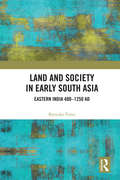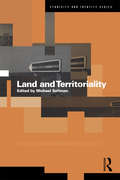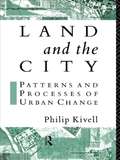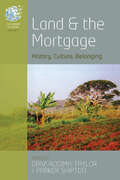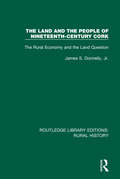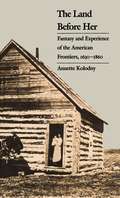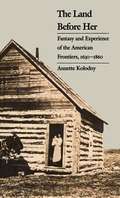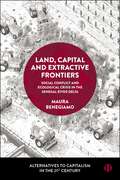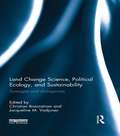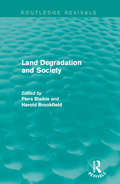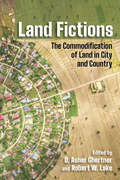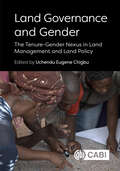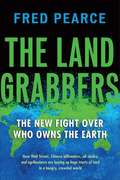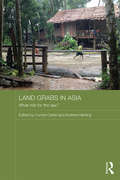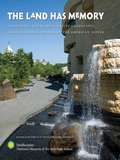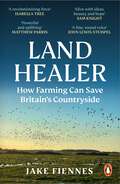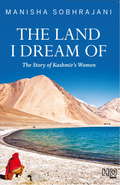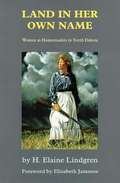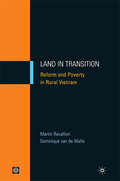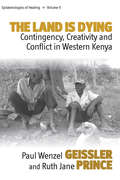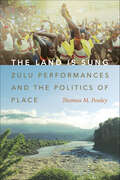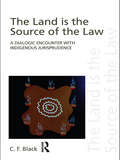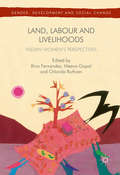- Table View
- List View
Land and Society in Early South Asia: Eastern India 400–1250 AD
by Ryosuke FuruiThis volume explores the process of social changes which unfolded in rural society of early medieval Bengal, especially the formation of stratified land relations and occupational groups which later got systematised as jātis. One of the first books to systematically reconstruct the early history of the region, this book presents a history of the economy, polity, law, and social order of early medieval Bengal through a comprehensive study of land and society. It traces the changing power relations among constituents of rural society and political institutions, and unravels the contradictions growing among them. The author describes the changing forms of agrarian development which were deeply associated with these overarching structures and offers an in-depth analysis of a wide range of textual sources in Sanskrit and other languages, especially contemporary inscriptions pertaining to Bengal. The volume will be an essential resource for researchers and academics interested in the history of Bengal, and the social and economic history of early South Asia.
Land and Territoriality (Ethnicity and Identity)
by Michael SaltmanIn the past, territorial conflict usually involved major powers seeking hegemony over strategic spaces and resources. More recently, however, the decline of opposing global power blocs has elevated ethnicity to a prime cause of conflict over land. This book considers the multiple roles ethnicity plays in fostering territorial conflicts, both violent and non-violent, across the globe. While land disputes relating to nationalism have resulted in the loss of human life in some regions, in others ties between ethnicity and land are asserted more peacefully. Nationalism and challenges to the validity of the links between people and places have caused widespread bloodshed in the disputed territory of Palestine, involving competing claims of Arabs and Jews, have led to war. In North America, however, indigenous Indians' claims to land are settled in the courts, rather than through violence. This book shows how human behaviour is affected by the multiple ways in which people identify with land, topography and natural resources. In doing so, it highlights the growing trend towards defining physical space in specific ethnic contexts, associated with a contemporary world that facilitates global movement.
Land and the City: Patterns and Processes of Urban Change (Geography And Environment Ser.)
by Philip KivellFirst Published in 2004. Routledge is an imprint of Taylor & Francis, an informa company.
The Land and the Loom: Peasants and Profit in Northern France, 1680–1800
by Liana VardiIn the modern imagination the peasant survives as a creature of the land, suspicious of the outside world and resistant to change, either the repository of pristine innocence and virtue or the manifestation of everything nasty, brutish, and at best dull. The Land and the Loom replaces this picture with a richly textured, deeply researched portrait of the peasant's life and world in northern France in the early modern period. Drawing on evidence culled from parish registers, notarial records, and judicial archives, Liana Vardi outlines the development of the linen weaving trade in Montigny and details the local peasants' participation. The peasants that emerge from her study are not the figures of tradition, driven solely by symbolic attachment to the land and unreasonably devoted to village solidarities. Instead they reveal remarkable flexibility and diversity, not only improving farming methods and raising yields during the eighteenth century, but also using land to finance investments in industry and to develop local business, far-flung commercial networks and complex credit mechanisms. The eighteenth-century French countryside appears as a region and time of capitalist experimentation, cut short by pre-Revolutionary and Revolutionary crises.Meticulously documented, broadly interpretive, and beautifully written, this fascinating book will permenantly alter conventional perceptions of peasant life and rural industry and, ultimately, the way ordinary people are seen in seemingly distant times and places.
Land and the Mortgage: History, Culture, Belonging (The Human Economy #9)
by Daivi Rodima-Taylor and Parker ShiptonThe mortgaging of land is not just economic and legal but also social and cultural. Here, anthropologists, historians, and economists explore origins, variations, and meanings of the land mortgage, and the risks to homes and livelihoods. Combining findings from archives, printed records, and live ethnography, the book describes the changing and problematic assumptions surrounding mortgage. It shows how mortgages affect people on the ground, where local forms of mutuality mix with larger bureaucracies. The outcomes of mortgage in Africa, Europe, Asia, and America challenge economic development orthodoxies, calling for a human-centered exploration of this age-old institution.
The Land and the People of Nineteenth-Century Cork: The Rural Economy and the Land Question (Routledge Library Editions: Rural History #5)
by James S. Donnelly, JrFirst published in 1975. Using estate records, local newspapers and parliamentary papers, this book focuses upon two central and interrelated subjects – the rural economy and the land question – from the perspective of Cork, Ireland’s southernmost country. The author examines the chief responses of Cork landlords, tenant farmers and labourers to the enormous difficulties besetting them after 1815. He shows how the great famine of the late 1840s was in many ways an economic and social watershed because it rapidly accelerated certain previous trends and reversed the direction of others. He also rejects the conventional view of the land war of the 1880s, arguing that in Cork it was essentially a ‘revolution of rising expectations’, in which tenant farmers struggled to preserve their substantial material gains since 1850 by using the weapons of ‘agrarian trade unionism’, civil disobedience and unprecedented violence. This title will be of interest to students of rural history and historical geography.
The Land Before Her
by Annette KolodnyTo discover how women constructed their own mythology of the West, Kolodny examines the evidence of three generations of women's writing about the frontier. She finds that, although the American frontiersman imagined the wilderness as virgin land, an unspoiled Eve to be taken, the pioneer woman at his side dreamed more modestly of a garden to be cultivated. Both intellectual and cultural history, this volume continues Kolodny's study of frontier mythology begun in The Lay of the Land.
The Land Before Her: Fantasy and Experience of the American Frontier 1630-1860
by Annette KolodnyPreface The purpose of this study is to chart women's private responses to the successive American frontiers and to trace a tradition of women's public statements about the west. The attention accorded letters and diaries should not suggest that this is a study of the daily lives of pioneer women, however. Nor should the analysis of three centuries of published materials suggest that I have attempted any definitive literary history. Although I have made extensive use of letters and diaries composed between 1630 and 1860, I have not attempted a revisionist history of the westward movement as seen through the eyes of women. Such a history is nonetheless long overdue, and I sincerely hope my chapters may encourage further work toward that end. In that event, my contribution may be the reminder that white women began as pioneers to this continent in the seventeenth century. Only by acknowledging the fullness of that history will we be able to grasp the continuities linking later generations with what had gone before.
Land, Capital and Extractive Frontiers: Social Conflict and Ecological Crisis in the Senegal River Delta (Alternatives to Capitalism in the 21st Century)
by Maura BenegiamoThis book examines ‘land-grabbing’ - its colonial roots and the fraught relationship between capital and nature amidst the current global socio-ecological crisis. Through ethnographic and archival research, Maura Benegiamo investigates an Italian company’s acquisition of 20,000 hectares in Senegal’s River Delta for agrofuel production and delves into the struggles of pastoral communities affected by the project. Through this landmark case, the book shows how European energy and global food security policies are reshaping rural spaces, expanding agrarian extractivism in sub-Saharan Africa. By shedding light on how contemporary capital–nature relationships perpetuate socio-ecological crises and colonial models, the book highlights the enduring forms of opposition to these processes. At the heart of these struggles lies a crucial question: how can we understand today’s crises while reclaiming alternative ways of living, producing and inhabiting the land?
Land Change Science, Political Ecology, and Sustainability: Synergies and divergences
by Christian Brannstrom Jacqueline M. VadjunecRecent claims regarding convergence and divergence between land change science and political ecology as approaches to the study of human-environment relationships and sustainability science are examined and analyzed in this innovative volume. Comprised of 11 commissioned chapters as well as introductory and concluding/synthesis chapters, it advances the two fields by proposing new conceptual and methodological approaches toward integrating land change science and political ecology. The book also identifies areas of fundamental difference and disagreement between fields. These theoretical contributions will help a generation of young researchers refine their research approaches and will advance a debate among established scholars in geography, land-use studies, and sustainability science that has been developing since the early 2000s. At an empirical level, case studies focusing on sustainable development are included from Africa, Central and South America, and Southeast Asia. The specific topics addressed include tropical deforestation, swidden agriculture, mangrove forests, gender, and household issues.
Land Degradation and Society (Routledge Revivals)
by Harold Brookfield Piers BlaikieWhy does land management so often fail to prevent soil erosion, deforestation, salination and flooding? How serious are these problems, and for whom? This book, first published in 1987, sets out to answer these questions, which are still some of the most crucial issues in development today, using an approach called ‘regional political ecology’. This approach acknowledges that the reason why land management can fail are extremely varied, and must include a thorough understanding of the changing natural resource base itself, the human response to this, and broader changes in society, of which land managers are a part. Land Degradation and Society is essential reading for all students of geography, agriculture, social sciences, development studies and related subjects.
Land Fictions: The Commodification of Land in City and Country (Cornell Series on Land: New Perspectives on Territory, Development, and Environment)
Land Fictions explores the common storylines, narratives, and tales of social betterment that justify and enact land as commodity. It interrogates global patterns of property formation, the dispossessions property markets enact, and the popular movements to halt the growing waves of evictions and land grabs.This collection brings together original research on urban, rural, and peri-urban India; rapidly urbanizing China and Southeast Asia; resource expropriation in Africa and Latin America; and the neoliberal urban landscapes of North America and Europe. Through a variety of perspectives, Land Fictions finds resonances between local stories of land's fictional powers and global visions of landed property's imagined power to automatically create value and advance national development. Editors D. Asher Ghertner and Robert W. Lake unpack the dynamics of land commodification across a broad range of political, spatial, and temporal settings, exposing its simultaneously contingent and collective nature. The essays advance understanding of the politics of land while also contributing to current debates on the intersections of local and global, urban and rural, and general and particular.Contributors Erik Harms, Michael Watts, Sai Balakrishnan, Brett Christophers, David Ferring, Sarah Knuth, Meghan Morris, Benjamin Teresa, Mi Shih, Michael Levien, Michael L. Dwyer, Heather Whiteside
Land Governance and Gender: The Tenure-Gender Nexus in Land Management and Land Policy
by Uchendu Eugene ChigbuThis book delivers new conceptual and empirical studies surrounding the design and evaluation of land governance, focusing on land management approaches, land policy issues, advances in pro-poor land tenure and land-based gender concerns. It explores alternative approaches for land management and land tenure through international experiences. Part 1 covers Concepts, debates and perspectives on the governance and gender aspects of land. Part 2 focuses on Tenure-gender dimensions in land management, land administration and land policy. It deals with land issues within the interface of theory and practice. Part 3 covers Applications and experiences: techniques, strategies, tools, methods, and case studies. Part 4 focuses on Land governance, gender, and tenure innovations. Case studies discussed include China, Ethiopia, Ghana, Lesotho, Germany, Mexico, Mozambique, Rwanda, South Korea, etc. Themes include Islamic tenure, reverse migration, matriarchy/matrilineal systems, structural inequality, tenure-responsive planning, land-related instabilities and COVID-19, urban-rural land concerns, women's tenure bargaining, tenure-gender nexus concerns in developing and developed countries. This book: · Includes theoretical or empirical studies on land governance and gender from a diverse group of countries. · Provides the basis for a new land administration theory to be set against conventional land administration approaches. · Offers, in an accessible manner, a range of new tools for design and evaluation of land management interventions. The book will be valuable for students and researchers in land governance, urban and rural planning, international development,natural resource management, agriculture, community development, and gender studies. It is also useful for land practitioners, including those working within international organizations.
The Land Grabbers
by Fred PearceAn unprecedented land grab is taking place around the world. Fearing future food shortages or eager to profit from them, the world’s wealthiest and most acquisitive countries, corporations, and individuals have been buying and leasing vast tracts of land around the world. The scale is astounding: parcels the size of small countries are being gobbled up across the plains of Africa, the paddy fields of Southeast Asia, the jungles of South America, and the prairies of Eastern Europe. Veteran science writer Fred Pearce spent a year circling the globe to find out who was doing the buying, whose land was being taken over, and what the effect of these massive land deals seems to be. The Land Grabbersis a first-of-its-kind exposé that reveals the scale and the human costs of the land grab, one of the most profound ethical, environmental, and economic issues facing the globalized world in the twenty-first century. The corporations, speculators, and governments scooping up land cheap in the developing world claim that industrial-scale farming will help local economies. But Pearce’s research reveals a far more troubling reality. While some mega-farms are ethically run, all too often poor farmers and cattle herders are evicted from ancestral lands or cut off from water sources. The good jobs promised by foreign capitalists and home governments alike fail to materialize. Hungry nations are being forced to export their food to the wealthy, and corporate potentates run fiefdoms oblivious to the country beyond their fences. Pearce’s story is populated with larger-than-life characters, from financier George Soros and industry tycoon Richard Branson, to Gulf state sheikhs, Russian oligarchs, British barons, and Burmese generals. We discover why Goldman Sachs is buying up the Chinese poultry industry, what Lord Rothschild and a legendary 1970s asset-stripper are doing in the backwoods of Brazil, and what plans a Saudi oil billionaire has for Ethiopia. Along the way, Pearce introduces us to the people who actually live on, and live off of, the supposedly “empty” land that is being grabbed, from Cambodian peasants, victimized first by the Khmer Rouge and now by crony capitalism, to African pastoralists confined to ever-smaller tracts. Over the next few decades, land grabbing may matter more, to more of the planet’s people, than even climate change. It will affect who eats and who does not, who gets richer and who gets poorer, and whether agrarian societies can exist outside corporate control. It is the new battle over who owns the planet.
Land Grabs in Asia: What Role for the Law? (Routledge Contemporary Asia Series)
by Connie Carter Andrew HardingAlthough there is no universally accepted definition of the term "land grabbing", ordinary people whose livelihoods are adversely affected by land grabbing know exactly what it is. It involves the physical capture and control of land and homes, including the usurpation of the power to decide how and when these will be used and for what purposes – with little or no prior consultation or compensation to the displaced communities. This thought-provoking book defines land grabbing, and examines aspects of the land grabs phenomenon in seven Asian countries, researched and written by country-specific legal scholars. The book provides unique perspectives on how and why land grabbing is practised in China, India, Pakistan, Cambodia, Malaysia, Myanmar and Indonesia, and explores the surprising role that law plays in facilitating and legitimizing land grabs in each country. In contrast to most of the literature which law focuses on foreign investors’ rights under international law, here the focus is on domestic laws and legal infrastructures. Finding that Asian States need to move beyond existing regimes that govern land to a regime that encourages more equitable land rights allocation and protection of stakeholders’ rights, the book urges further research in the nexus between the use of law to facilitate development. Land Grabs in Asia is the first book to explore land grabbing in multiple jurisdictions in Asia. As such, it will appeal to students and scholars of law and development, law and society, and international relations, as well as being essential reading for development policy-makers and government ministers.
The Land Has Memory: Indigenous Knowledge, Native Landscapes, and the National Museum of the American Indian
by Duane Blue SpruceIn the heart of Washington, D. C. , a centuries-old landscape has come alive in the twenty-first century through a re-creation of the natural environment as the region's original peoples might have known it. Unlike most landscapes that surround other museums on the National Mall, the natural environment around the Smithsonian's National Museum of the American Indian (NMAI) is itself a living exhibit, carefully created to reflect indigenous ways of thinking about the land and its uses. Abundantly illustrated,The Land Has Memoryoffers beautiful images of the museum's natural environment in every season as well as the uniquely designed building itself. Essays by Smithsonian staff and others involved in the museum's creation provide an examination of indigenous peoples' long and varied relationship to the land in the Americas, an account of the museum designers' efforts to reflect traditional knowledge in the creation of individual landscape elements, detailed descriptions of the 150 native plant species used, and an exploration of how the landscape changes seasonally. The Land Has Memoryserves not only as an attractive and informative keepsake for museum visitors, but also as a thoughtful representation of how traditional indigenous ways of knowing can be put into practice.
Land Healer: How Farming Can Save Britain’s Countryside
by Jake Fiennes'Jake Fiennes is changing the face of farming in Britain... a revolutionising force' Isabella TreeOur relationship with our land is broken: we must heal it.Jake Fiennes is on a mission to change the face of the English countryside. As Conservation Manager at Holkham in Norfolk, one of the country's largest historic country estates, his radical habitat restoration and agricultural work has nurtured its species and risen its crop yields - bringing back wetlands, hedgerows, birds and butterflies over 25,000 acres of land.But this isn't rewilding - there is no 'wild' in Britain anymore. Mass farming, crop science and industrial chemicals have destroyed the majority of our natural landscape and wildlife over the last century. Land Healer is the story of Fiennes's ambition to bring back our flora and fauna - by reclaiming our traditions and trialling new experiments which could restore our symbiosis with our land, and save our shared future.Following the farming year and the natural cycle of the seasons, Land Healer chronicles a life of conservation lived at the edges, and is a manifesto for rethinking our relationship with the natural world before it's too late.
The Land I Dream Of: The Story of Kashmir's Women
by Manisha SobhrajaniIn any conflict, the worst affected are always the women? The narrative around the Jammu-and-Kashmir insurgency continues to be built around the role of freedom fighters, insurgents and politicians ? all of them, not surprisingly, men. Yet, women have played an extraordinary role in the history of Kashmir, in retaining Kashmiriyat ? that long-forgotten ideal of mutual co-existence. Equally, as mothers, daughters, widows, fighters, martyrs and mujahids, they have been inseparable from the four-decade-old conflict. In The Land I Dream of, researcher Manisha Sobhrajani documents her encounters with women from disparate backgrounds across the troubled state. A Kashmiri Pandit forced into exile as a child; a mother-figure battling the establishment to give hope to thousands like her whose men have disappeared; an eighty-year-old who trained to fight tribal invaders in 1947 as part of Kashmir?s first women-only militia; and young Muslim women empowering themselves through entrepreneurship ? the lives she chronicles bear witness not just to the suffering and apathy Kashmiri women have had to endure but also to their strength in the face of it all. Combining individual recollection with journalistic endeavour, this searingly personal account of loss and despair and equally of hope and optimism is a testament to the resilience of the women in one of the world?s most fractious regions.'
Land in Her Own Name: Women as Homesteaders in North Dakota
by H. Elaine Lindgren"Land is often known by the names of past owners. "Emma's Land," "Gina's quarter," and "the Ingeborg Land" are reminders of the many women who homesteaded across North Dakota in the late nineteenth and early twentieth centuries. Land in Her Own Name records these homesteaders' experiences as revealed in interviews with surviving homesteaders and their families and friends, land records, letters, and diaries." "These women's fascinating accounts tell of locating a claim, erecting a shelter, and living on the prairie. Their ethnic backgrounds include Yankee, Scandinavian, German, and German-Russian, as well as African-American, Jewish, and Lebanese. Some were barely twenty-one, while others had reached their sixties. A few lived on their land for life and "never borrowed a cent against it"; others sold or rented the land to start a small business or to provide money for education."--BOOK JACKET. Title Summary field provided by Blackwell North America, Inc. All Rights Reserved
Land in Transition
by Dominique van de Walle Martin RavallionThis book is a case study of Vietnam's efforts to fight poverty using market-oriented land reforms. In the 1980s and 1990s, the country undertook major institutional reforms, and an impressive reduction in poverty followed. But what role did the reforms play? Did the efficiency gains from reform come at a cost to equity? Were there both winners and losers? Was rising rural landlessness in the wake of reforms a sign of success or failure? 'Land in Transition' investigates the impacts on living standards of the two stages of land law reform: in 1988, when land was allocated to households administratively and output markets were liberalized; and in 1993, when official land titles were introduced and land transactions were permitted for the first time since communist rule began. To fully assess the poverty impacts of these changes, the authors' analysis of household surveys is guided by both economic theory and knowledge of the historical and social contexts. The book delineates lessons from Vietnam's experience and their implications for current policy debates in China and elsewhere.
The Land Is Dying
by Ruth Jane Prince Paul Wenzel GeisslerBased on several years of ethnographic fieldwork, the book explores life in and around a Luo-speaking village in western Kenya during a time of death. The epidemic of HIV/AIDS affects every aspect of sociality and pervades villagers' debates about the past, the future and the ethics of everyday life. Central to such debates is a discussion of touch in the broad sense of concrete, material contact between persons. In mundane practices and in ritual acts, touch is considered to be key to the creation of bodily life as well as social continuity. Underlying the significance of material contact is its connection with growth - of persons and groups, animals, plants and the land - and the forward movement of life more generally. Under the pressure of illness and death, economic hardship and land scarcity, as well as bitter struggles about the relevance and application of Christianity and 'Luo tradition' in daily life, people find it difficult to agree about the role of touch in engendering growth, or indeed about the aims of growth itself.
The Land Is Sung: Zulu Performances and the Politics of Place
by Thomas M. PooleyWhat does it mean to belong? In The Land is Sung, musicologist Thomas M. Pooley shows how performances of song, dance, and praise poetry connect Zulu communities to their ancestral homes and genealogies. For those without land tenure in the province of KwaZulu-Nata, performances articulate a sense of place. Migrants express their allegiances through performance and spiritual relationships to land are embodied in rituals that invoke ancestral connection while advancing well-being through intergenerational communication. Engaging with justice and environmental ethics, education and indigenous knowledge systems, musical and linguistic analysis, and the ethics of recording practice, Pooley's analysis draws on genres of music and dance recorded in the midlands and borderlands of South Africa, and in Johannesburg's inner city. His detailed sound writing captures the visceral experiences of performances in everyday life. The book is richly illustrated and there is a companion website featuring both video and audio examples.
The Land is the Source of the Law: A Dialogic Encounter with Indigenous Jurisprudence
by C.F. BlackThe Land is the Source of Law brings an inter-jurisdictional dimension to the field of indigenous jurisprudence: comparing Indigenous legal regimes in New Zealand, the USA and Australia, it offers a ‘dialogical encounter with an Indigenous jurisprudence’ in which individuals are characterised by their rights and responsibilities into the Land. Though a relatively "new" field, indigenous jurisprudence is the product of the oldest continuous legal system in the world. Utilising a range of texts – films, novels, poetry, as well as "law stories" CF Black blends legality and narrative in order to redefine jurisprudentia in indigenous terms. This re-definition gives shape to the jurisprudential framework of the book: a shape that is not just abstract, but physical and metaphysical; a shape that is circular and concentric at the same time. The outer circle is the cosmology, so that the human never forgets that they are inside a universe – a universe that has a law. This law is found in the second circle which, whilst resembling the ancient Greek law of physis is a law based on relationship. This is a relationship that orders the placing of the individual in the innermost circle, and which structures their rights and responsibilities into the land. The jurisprudential texts which inform the theoretical framework of this book bring to our attention the urgent message that the Djang (primordial energy) is out of balance, and that the rebalancing of that Djang is up to the individual through their lawful behaviour, a behaviour which patterns them back into land. Thus, The Land is the Source of the Law concludes not only with a diagnosis of the cause of climate change, but a prescription which offers an alternative legal approach to global health.
Land, Labour and Livelihoods
by Bina Fernandez Meena Gopal Orlanda RuthvenThis book brings together a unique collection of theoretical and empirical analyses of women's access to land, labour and livelihoods in contemporary India. The authors recognize that gender relations must be viewed intersectionally, along with other social relationships such as caste, ethnicity, religion, sexuality and age, in order to inform an integrated analysis of women's persistent disadvantage in India. The chapters examine a diverse range of rural and urban livelihoods within sectors such as tea plantations, nursing, hair salons, sex work and waste collection. Documenting the shifts in these sectors in the context of economic liberalization, the authors offer insights on the challenges of development interventions as women negotiate shifts in their livelihood options. Written to engage, the contributions to this book will be of interest both to the general reader and to academics and practitioners in development and gender/women's studies.
Land, Labour and Livelihoods: Indian Women's Perspectives (Gender, Development and Social Change)
by Bina Fernandez Meena Gopal Orlanda RuthvenThis book brings together a unique collection of theoretical and empirical analyses of women’s access to land, labour and livelihoods in contemporary India. The authors recognize that gender relations must be viewed intersectionally, along with other social relationships such as caste, ethnicity, religion, sexuality and age, in order to inform an integrated analysis of women’s persistent disadvantage in India. The chapters examine a diverse range of rural and urban livelihoods within sectors such as tea plantations, nursing, hair salons, sex work and waste collection. Documenting the shifts in these sectors in the context of economic liberalization, the authors offer insights on the challenges of development interventions as women negotiate shifts in their livelihood options. Written to engage, the contributions to this book will be of interest both to the general reader and to academics and practitioners in development and gender/women’s studies.
